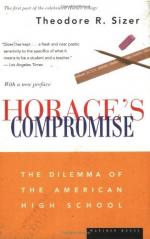|
This section contains 4,619 words (approx. 16 pages at 300 words per page) |

|
SOURCE: West, David. “Some General Principles.” In Reading Horace, pp. 125-41. Edinburgh: Edinburgh University Press, 1967.
In the following essay, West proposes some general principles for the reading of Horace, including the need to be as true as possible to the Latin in translation and the need to view the text within the framework in which it was written, discarding contemporary prejudices.
‘Then farewell, Horace, whom I hated so, Not for thy faults, but mine: It is a curse To understand, not feel, thy lyric flow, To comprehend, but never love thy verse.’
Lord Byron Childe Harold's Pilgrimage
In analysing these few Odes, I have attempted to convey some impression of the quality of Horace's lyric poetry: his sense of humour, his sympathetic response to life in its many aspects, his profound debt to many previous Greek writers. Pindar is only one of the great poets whose work Horace...
|
This section contains 4,619 words (approx. 16 pages at 300 words per page) |

|


